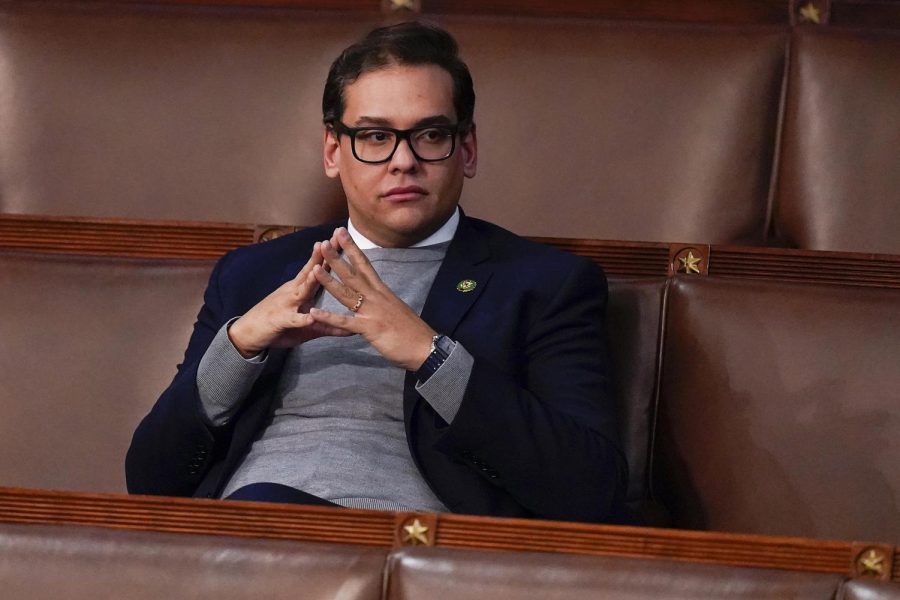Santos controversy reflects broader trends
The embattled representative is the latest actor in the U.S’. dishonest politics
Rep. George Santos (R-N.Y.) sits alone in the House chamber.
February 9, 2023
Newly elected U.S. Rep. George Santos (R-N.Y.) “temporarily” stepped down on Jan. 31 from his House Committee assignments due to the negative attention he has received for reportedly fabricating his background. Santos made several false statements about his education, family history, professional life and even how he financed his campaign for the House.
Spokespeople from both Horace Mann School and Baruch College, the high school and college where Santos claims to be an alumnus, could not verify his attendance at their institutions. Representatives from Goldman Sachs and Citigroup also had no record that Santos worked for either company. Additional lies include his religious heritage, income source and campaign cash — as well as a series of stories that no one can corroborate.
Santos has made people, including Senator Mitt Romney (R-Utah), especially angry, both at him and at a Republican party that largely refuses to call for his resignation.
“You don’t belong here,” Romney told Santos during the State of the Union address on Tuesday night. But for Romney to say that to Santos and not to anyone else —- in a room full of several other politicians who have behaved unethically — doesn’t make much sense.
While the scale of Santos’ lies is unlike anything I have ever seen before, Santos is not the first politician to lie in order to be elected. Lying is bad, and the more you do a bad thing, the greater that impact is. But Santos is under more scrutiny for lying repeatedly than for lying at all, and that scrutiny is a little misplaced. Santos’ fabrications are extreme evidence of a commonplace political practice that should not be tolerated.
From promises that they never intend to keep, to embellished — or fabricated — backgrounds, politicians lie all the time to try to win their elections. For instance, President Joe Biden never got arrested for trying to meet with Nelson Mandela in South Africa, no matter how many times he says he was. Other people’s conduct does not change the weight of Santos’, but the level of scrutiny Santos is under now should be the normal level of scrutiny for politicians who lie. With that being said, lying to voters is not grounds for throwing somebody out of office. If Santos continues to refuse to resign, he will still have to answer to his constituency when his term ends. While it would be fairer for him to resign now and face potential voters in a new, special election, that decision is ultimately his to make.
It turns out that Santos also allegedly broke several campaign finance laws, which is a different issue. If he is found responsible for any illegal activity, getting thrown out of office would likely be the least of his concerns. The amount of evidence establishing his behavior as habitual would likely be difficult to mitigate in a court of law.
The bigger problem with the Santos controversy is that it took a case as extreme as his to get people to seriously question the culture of dishonesty in politics. This culture has only festered because, typically, a politician caught in a lie is allowed to move on with minimal consequences. Removing Santos from his committees while he continues to collect his annual $174k salary will do little to dissuade future politicians from lying to get ahead. Santos might not have a political future ahead of him, but the damage his election has caused to democracy and American institutions is already done.
If we, as voters, truly want to challenge a political culture of dishonesty, it is our responsibility to demand honesty from our elected officials. While some politicians may display qualities that are compelling despite their untrustworthiness, I am willing to prioritize genuineness over policy if the cost of doing so is not too high. Research has shown that one of the strongest deterrents from corrupt behavior is a high likelihood of detection and punishment. That punishment often comes in the form of criminal charges, but it could also manifest as electoral defeat. While Congress can limit the damage Santos can do with his ill-gotten seat, our best remedy is using our ballot to vote for fair, honest politicians.






















